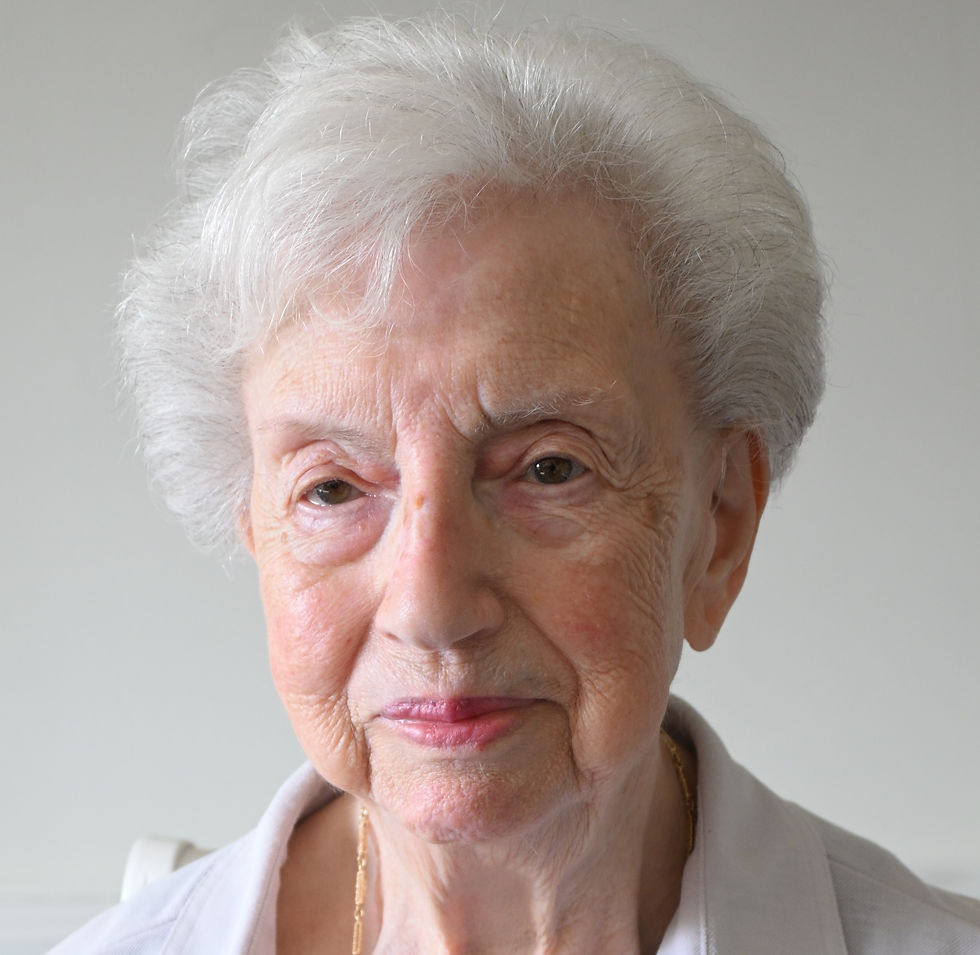I'm a paragraph. Click here to add your own text and edit me. It's easy.
I'm a paragraph. Click here to add your own text and edit me. It's easy.
I'm a paragraph. Click here to add your own text and edit me. It's easy.
Latest:

The copyright of all photographs belongs to individual interviewees. Please get in touch for more information
Eva Klein


Arrived in Britain:
Place of Birth:
Born:
1960
1929
Interview number:
Experiences:
RV
316
Interviewer:
Dr Bea Lewkowicz
Date of Interview:
Monday, 7 July 2025
Interview Summary:
Eva Klein (née Adler) was born on 6 May 1929 in Debrecen, Hungary, into an Orthodox Jewish family. Her three brothers were between sixteen and twenty-one at the time of her birth, and her father died when she was one year old, leaving her mother widowed with four children to support. Klein grew up closely connected to her extended maternal family, particularly her grandmother and aunt, who lived in what was then part of Romania. She later recalled that she knew her mother’s family well but had almost no contact with her father’s relatives until 1943.
Her early childhood included the marriages of two brothers, which introduced sisters-in-law who assumed roles in her upbringing. She developed a close relationship with her brother’s young sister-in-law, who was only a few months older than her, and with whom she maintained lifelong contact. During her early years, a non-Jewish caregiver, Zsuzsa (“Czuli”), played a significant role in her daily life until anti-Jewish restrictions forced her to leave the household when their home became part of the ghetto.
Klein recounted an incident shortly before the ghetto period when robbers entered the family home and threatened her and her mother at gunpoint while demanding valuables. She described her mother’s intervention and the intruders’ departure without violence.
Following the German occupation of Hungary, Klein and her family were deported. They were transported to Strasshof in Austria, a site she described as a “big place” from which groups were assigned to various locations. She recalled arriving there with family members, including small children who had to be carried, before being transferred to a school building on Hackengasse in Vienna, in the Fifteenth District.
Klein later described conditions in Dresden Barracks in Terezin, where her mother, brother, sister-in-law and in-laws were accommodated on different floors. She reported that two days before liberation she received a parcel containing milk and chocolate from other children, and that on 8 May 1945 she witnessed the retreat of German soldiers. A soldier aimed his rifle at her; the shot missed and struck the wall above her bed. The camp was liberated soon afterwards by Soviet forces.
After liberation, Klein encountered a cousin from Czechoslovakia in Theresienstadt after recognising the name of his village mentioned by other inmates. She managed to send him a note in Hungarian, resulting in his locating her and accompanying her family to the railway station from which they travelled back to Hungary.
Returning to Debrecen, Klein did not re-enter secondary school. She attended a music school where singing was her principal subject and piano her secondary instrument. She purchased the piano using a student grant, while her mother worked to support her studies.
In 1950 she married László Klein. They held their civil wedding in Budapest and a religious ceremony in Debrecen at the Kápolnási Synagogue, where her mother prepared the wedding meal. After marriage, the couple lived in Budapest and both worked; Klein later undertook a course in accountancy, eventually handling bank reconciliations and office duties. She attributed her mathematical abilities to instruction from her brothers in childhood.
The couple emigrated to Austria in 1956 and subsequently in 1960 to the United Kingdom after her husband obtained employment as a shoe designer in south Wales. Klein worked in the accounts department of the same shoe factory and began learning English after settling there. She later moved to London, where she worked in Piccadilly performing financial and administrative duties for Jewish organisations, including responsibilities for processing payments and managing invoices. She developed close friendships with colleagues and remained in these roles for many years.
In her later life Klein remained engaged with community organisations, preserved family photographs and artworks, and documented the histories of her relatives, including her brother who became an art teacher and later lived in Israel before his death in 1965. She retained several of his paintings and described their personal significance.
Key words:Klein. Adler. Debrecen ghetto. Budapest. Slave labour, 11 Hackengasse Vienna 15th district (camp). Terezin. Emigration from Hungary1956. Israel. Cardiff. Wales. Brother Miklos Adler painter, Israel.





